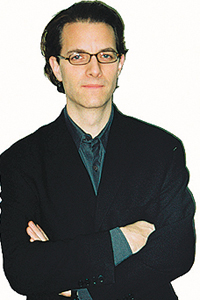![[Chronicle]](/images/sidebar_header_oct06.gif)
Vol. 26 No. 7
current issue
archive / search
contact
Past Opine interviews:
Lauren Berlant
Stephen Berry
John Boyer
David Cohen
Jerry Coyne
John Cunningham
Richard Epstein
John Frederick
Henry Frisch
Austan Goolsbee
Bernard Harcourt
Greg Jackson
Martin Marty
Martha Nussbaum
Raymond Pierrehumbert
José Quintáns
Jan-Marino Ramirez
Saskia Sassen
William Sewell
Herman Sinaiko
Geoffrey Stone
Cass Sunstein
Simon Swordy
Opine: Bernard Harcourt
 Bernard Harcourt | |
This week, Bernard Harcourt, the Julius Kreeger Professor of Law and Criminology in the Law School, is of the opinion . . .
What book should every person read and why?
Ian Hacking’s The Taming of Chance—because it’s absolutely brilliant and recasts entirely the emergence of probabilistic thinking that dominates today . . . and because he’ll be here during the Spring Quarter. Whatever you do, do not miss his lectures.
If you could meet any scholar, author, composer, musician or entrepreneur, dead or alive, who would it be and why?
Out of a recent surge of rage and sense of disillusionment, I’m afraid it would be Michel Foucault—to ask him why he never confessed, why he never admitted that his own disciplinary hypotheses were themselves nothing more than power/knowledge constructs.
Among the complex moral and political issues that affect humanity, which do you believe will never be resolved and why?
Whether there is a basis for morality . . . I suspect Nietzsche was probably right.
If politicians had to pass an exam before they were allowed to serve in public office, what question would you add to the test?
Should the University of Chicago retain the Uncommon Application? (That should be a litmus test).
If you could choose any three University professors and give them a one-year sabbatical together to solve a problem, develop a theory or make a discovery, who would they be and what task would you assign them?
Task: To determine whether all our social sciences findings over the course of the 20th century achieved a rate of accuracy better than a coin toss. Professors: Andrew Abbott, Danielle Allen and Stephen Stigler—and their answer, I anticipate, might well tell us that we would have been better turning instead to randomization.
Think of a renowned scholar from the past who added great value to your area of study. What would this person think of the advances that recently have been made in this field?
Cesare Beccaria, the author, at the youthful age of 25, of the time-immemorial On Crimes and Punishments. Having written a brief essay on smuggling in 1764 that used mathematical equations to quantify how tariffs would affect the amount of contraband, he would be surprised I suspect that it took 200 years for rational choice theorists to follow in his footsteps.
What building on campus do you think is the most interesting architecturally and why?
Ida Noyes Hall because of the monkeys carved into the wooden banisters on the first floor. Why did we ever stop doing that?
Will a liberal arts education remain relevant to students in our increasingly technological society? Why or why not?
Yes, of course, because the technology always fails. And when it does and the lights are out, we’ll sit around the fire with a good Merlot and have the best of discussions.
How will the next generation of scholars—today’s students—change your field in the decades to come?
They—and only they—will manage to properly integrate first-rate empirical research with radical critical theory.